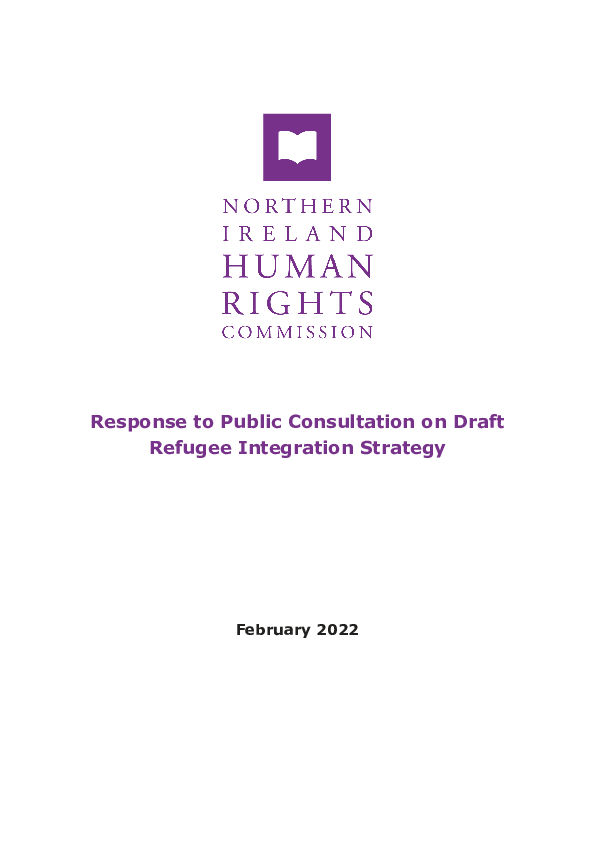NIHRC Response to the Public Consultation on a Draft Refugee Integration Strategy
Date produced February 2022.
Below is a summary of the recommendations.
You can also download the full document through the links provided.
The NIHRC recommends that:
2.12 the Executive Office adds an early statement to the effect that the strategy represents a human rights-based approach, which in turn requires public authorities to adopt a human rights-based approach, which includes Protocol Article 2.
2.13 the list of relevant human rights standards is expanded, as suggested above, and explained, including relevant EU obligations which underpin the non-diminution commitment in Protocol Article 2.
2.14 the Executive Office undertakes a training needs analysis to identify whether human rights training is needed and thereafter to develop the necessary training including on drafting, implementation, monitoring and evaluation of strategy.
2.21 the Executive Office develops this strategy and its outcomes to align fully with relevant substantive rights, including civil and political rights.
2.22 the Executive Office gives particular urgent consideration to the strategy and its outcomes on destitution. This should address immediate need and steps required to prevent destitution.
2.24 the Executive Office reconsiders the context section of the draft strategy and reviews existing law cited there to ensure there are no relevant omissions.
3.6 the Executive Office includes a commitment within the strategy to work with the Home Office and UK Government to ensure that all migrants, including refugees and asylum seekers, have access to, and enjoy, the full array of human rights on an equal basis to everyone else.
3.7 in the interests of clarity, the Executive Office sets out distinctions reflecting the current UK legal framework and consequential impact on access to services.
3.8 the outcomes section of the strategy should make it clear which outcome applies to which group(s).
3.12 the Executive Office ensures that tangible, understandable working definitions of ‘integration’ and ‘full potential’ are developed to aid effective implementation and monitoring of the strategy. These definitions should be developed through the effective participation of migrants, including asylum seekers and refugees.
3.18 greater consideration is given to language barriers faced by those affected by this strategy to remove those barriers.
3.19 the Executive Office review the strategy to ensure that the language used is appropriate and acceptable to those who are referenced. This is best achieved by seeking the views of those with lived experience.
4.9 the Executive Office develops a process for identifying and implementing positive action or special measures as required.
4.10 the Executive Office includes commitments that ensure an individual’s particular characteristics are considered and reasonably accommodated.
4.15 the Executive Office ensures the strategy is accessible.
4.16 in implementing the strategy the processes and procedures are accessible.
4.21 the Executive Office references at the outset that the best interests of the child are a primary consideration and ensures that is reflected throughout the strategy.
4.22 the Executive Office references at the outset that the best interests of the child are a primary consideration and ensures that is reflected throughout the strategy.
5.4 the Executive Office ensures effective participation in any further steps taken regarding this strategy.
5.5 the Executive Office ensures the necessary resources and training are available and accessible.
5.6 the Executive Office analyse its learning (including its case studies) and consultation responses to develop specific, measurable, achievable and relevant outcomes.
5.7 the Executive Office checks any personal information published to ensure the privacy of all individuals is protected.
6.7 the Executive Office develops and publishes a list of the key stakeholders to the delivery of the strategy.
6.8 that the Executive Office benchmarks the outcomes.
6.9 that the Executive Office includes a requirement that updates and reports to the Strategic Planning Group include information that is disaggregated to give due regard to groups with specific characteristics, for example, children, women, LGBTQI+ and persons with disabilities.
6.10 the Executive Office ensures that outsourcing of responsibilities to private entities or civil society will be monitored.
6.11 the strategy includes a commitment for the Strategic Planning Group to evaluate and report to the Executive Office.
6.20 further research is undertaken on the experiences of refugees and asylum seekers, at regular intervals.
6.21 Executive Office ensures a commitment to collect, monitor and publish robust data relevant to integration in NI that is comprehensively disaggregated in a way that reflects society and the range of identities of the subjects of the data. The data should be consistent and offer an opportunity for comparison across time and jurisdictions.
7.2 the Executive Office assesses the level of resources necessary and in setting the that the maximum available resources are utilised to ensure human rights compliance.
8.5 the Executive Office includes within the strategy a commitment on effective training. Training should include, at a minimum: fundamental human rights; identity awareness and cultural sensitivity; and racial equality. It should be extended to anyone likely to come into contact with a person affected by this strategy.
8.6 training is subject to periodic review and evaluation.

Your browser is out-of-date!
Update your browser to view this website correctly. Update my browser now